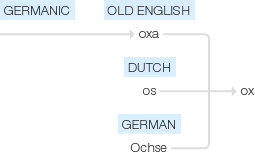Ox
Old English oxa, of Germanic origin; related to Dutch os and German Ochse, from an Indo-European root shared by Sanskrit ukṣán ‘bull’.
wiktionary
From Middle English oxe, from Old English oxa, from Proto-Germanic *uhsô (compare West Frisian okse, Dutch os, German Ochse), from Proto-Indo-European *uksḗn. Cognate with Welsh ych(“ox”), Tocharian A ops, Tocharian B okso(“draft-ox”), Avestan 𐬎𐬑𐬱𐬀𐬥 (uxšan, “bull”), Sanskrit उक्षन्(ukṣán).
etymonline
ox (n.)
"the domestic Bos taurus" (commonly meaning the castrated males, used to pull loads or for food), Middle English oxe, from Old English oxa "ox" (plural oxan), from Proto-Germanic *ukhson (source also of Old Norse oxi, Old Frisian oxa, Middle Dutch osse, Old Saxon, Old High German ohso, German Ochse, Gothic auhsa), from PIE *uks-en- "male animal," (source also of Welsh ych "ox," Middle Irish oss "stag," Sanskrit uksa, Avestan uxshan- "ox, bull"), said to be from root *uks- "to sprinkle," related to *ugw- "wet, moist." The animal word, then, is literally "besprinkler."
Also used from late Old English of the wild, undomesticated bovines. The black ox "misfortune, adversity, old age," etc., is by 1540s.
